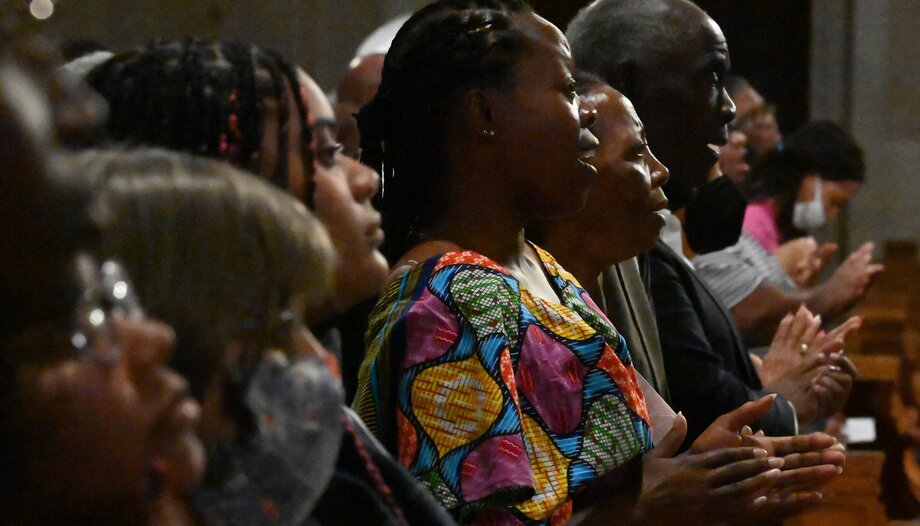His reflection came on the occasion of the World Day of Migrants and Refugees 2023The Church celebrates next Sunday, the 24th, on a weekend in which Pope Francis travels precisely to Marseille, at the closing of the "Encounters of the Mediterranean", as it has been reporting. Omnes.
Xavier Gómez OP specified that he referred to the development of Africa "because of its proximity, but the reflection also refers to other continents, everything is interconnected". In his opinion, "the migratory phenomenon is one of the phenomena that define our changing times, because of all the connections that take place around migrations, and the way of managing and dealing with them".
"The Church has been working on hospitality and recognizing itself with migrants ever since it became the Church," he stressed, "because the Catholic Church has been culturally diverse since its beginnings. The Church never sides with migrants. It is always at the side of migrants and refugees," added Xavier Gomez, "because the Church has hospitality in its DNA.
Codifying the right not to migrate
During his appearance, the head of migrations David Melián, a lawyer from the Canary Islands who works in the delegation of migration of the diocese of Canary Islands. This jurist has been a lawyer for migrants in the Canary Islands, and then visited their families, for example in Senegal, so his perspective is extremely enriching.
Both Xavier Gómez OP and David Melián have pointed out that "the right not to migrate is not codified and does not exist as such, and this is important. The Church says why not codify it in international legislation, to protect and give more rights so that people can develop their lives with dignity in their countries of origin".
As for Senegal, "the choice is not free. They come because they have no choice," said David Melián. "The need to promote conditions in the countries of origin so that people can make a free choice is very important".
"The figures are important - in the Canary Islands right now, they are striking - but behind these figures there are people. I think that the most important thing, as José Gabriel Vera (CEE Information Director, present at the event) said before, is to talk about people, and not so much about figures. Even if it were only one person, he already has the dignity to which Xavier referred. Providing figures dehumanizes. If they only talk to us about numbers, it doesn't touch our hearts, it doesn't move us".
Atlantic Hospitality Guide
Xavier Gómez informed that his department "is preparing at the international and interdiocesan level the Atlantic Guide of Hospitality, with countries and dioceses of southern Europe, Spain, specifically the Canary Islands, some dioceses of southern Spain, Ceuta and Melilla, and others of northwest Africa, Morocco, Senegal, Mauritania, and other countries, pointing to a vision of the future to respond to the challenge of migration". A project in collaboration with the Dicastery for Integral Human Development of the Holy See.
In addition, "we have the corridors of hospitality, in which there is solidarity between dioceses in the Canary Islands and with the peninsula, in order to promote the culture of hospitality and interdiocesan solidarity to facilitate the mobility of migrants in vulnerable situations and to challenge public administrations to assume their responsibility in this area".
"And then we have the Table of the rural world," he added, "that reads positively the job opportunities and the need that exists in the emptied Spain, we are committed to connect families who want to live in the villages with municipalities and entities that are promoting the revitalization of the villages. This will contribute to revitalize the villages, small Christian communities and ensure the rooting project of these families.
"Right to migrate in dignity"
At the same level as the right not to migrate, "the Church recognizes, advocates and promotes the right to migrate in dignity, not in any way," adds Xavier Gomez. "It proposes safe and legal ways for migration, dignified and safe reception, joint rescue and search operations, because migration is very exposed and we know the drama of those who leave their lives at sea, let us assume the duty that States have to rescue people, and do it jointly. And to look for the people who are lost, including the bodies that the sea swallows".
And then, "when we talk about arrival, the Church will be advocating, as the Pope says in 'Fratelli tutti', for the recognition of all migrants, displaced persons and refugees, the right to full citizenship, an important concept, which ensures the recognition of rights. And as it was done with the Ukrainian displaced persons, when it is activated in an effective way, it grants the work permit, the residence permit, and avoids being in an irregular administrative situation".
"It cannot be that the response to dissuade people from migrating is to inflict suffering on them, that obstacle course that we put them through. This year's campaign does not lose sight of everything that has to do with human mobility: the countries of origin, transit and arrival," says the head of migration of the EEC.








